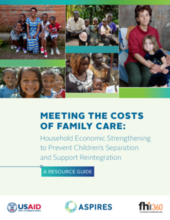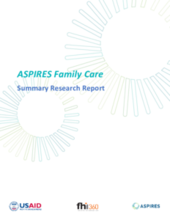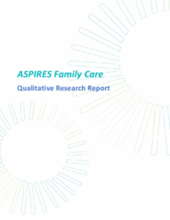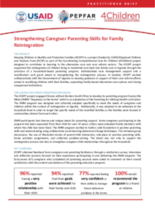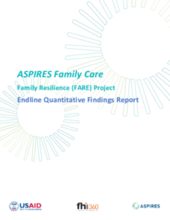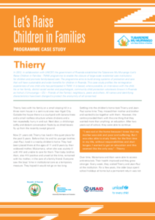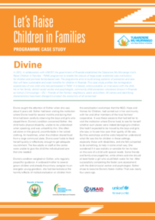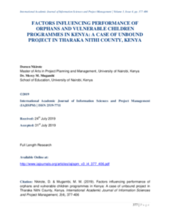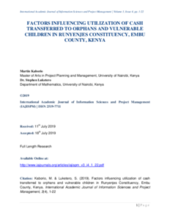Displaying 31 - 40 of 271
This resource guide aims to assist program designers, funders, and implementers to select and incorporate appropriate and effective household economic strengthening (HES) measures into programs to preserve or reestablish family care for children.
The Accelerating Strategies for Practical Innovation and Research in Economic Strengthening (ASPIRES) Family Care Project focused on how economic strengthening (ES) interventions can help prevent unnecessary separation of children from families as well as support the reintegration into family care of children who were already separated. This mixed methods evaluation was implemented alongside programming that included longitudinal quantitative data collection with all participating FARE and ESFAM households at three time points to assess a range of indicators related to household economic and family well-being, as well as in-depth, longitudinal qualitative research to help understand how (well), from participants’ perspectives, the FARE and ESFAM interventions aligned with perceived drivers of separation and families’ experienced child-level effects of programming.
In support of the Accelerating Strategies for Practical Innovation & Research in Economic Strengthening (ASPIRES) project's objective to assess the effects of different types of economic strengthening activities integrated with family support activities among targeted families, the Family Care project designed a mixed methods evaluation to be implemented alongside programming. The findings presented in this report are derived from the longitudinal descriptive data generated as part of the evaluation design.
This Practitioner Brief from the the Coordinating Comprehensive Care for Children (4Children) project presents key learning and recommendations from the Keeping Children in Healthy and Protective Families (KCHPF) project in Uganda, which supported the reintegration of children living in residential care back into family care through the provision of a household-based parenting program, individualized case management support and a reunification cash grant aimed at strengthening the reintegration process.
The Family Resilience (FARE) project was developed to help build the evidence base on how to appropriately match economic strengthening (ES) activities with families at risk of family-child separation and with families in the process of reintegrating a previously separated child. The project offered an opportunity for learning about how to provide ES and other family strengthening services and how well they worked. This report focuses on the latter and summarizes changes in key indicators related to family-child separation over the course of the project.
This case study profiles the reintegration experiences of one child who has participated in the Tubarerere Mu Muryango (Let’s Raise Children in Families - TMM) programme in Rwanda.
This case study profiles the reintegration experiences of one child who has participated in the Tubarerere Mu Muryango (Let’s Raise Children in Families - TMM) programme in Rwanda.
The purpose of this study was to investigate factors influencing performance of orphans and vulnerable children Programmes in Kenya focusing on unbound project in TharakaNithi County, Kenya.
The sole purpose of the study was to determine the factors influencing utilization of cash transferred to orphans and vulnerable children in Runyenjes Subcounty, Embu County. The study concluded that demographic characteristics had the greatest effect on the utilization of cash transferred to orphans and vulnerable children, followed by frequency of cash transferred then attitude of beneficiaries while home factors had the least effect to the utilization of cash transferred to orphans and vulnerable children.
In this video, One Sky Foundation share some of their work in Thailand supporting children from disadvantaged families to stay in education.

